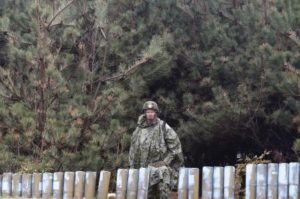Special to WorldTribune.com
 By Donald Kirk
By Donald Kirk
POHANG – An array of heavy-duty, sophisticated gear spread over the beaches here shows the incredible military might of the U.S. and South Korea. Far offshore, way beyond the horizon, the aircraft carrier Carl Vinson leads a “strike force” of warships.
Watching the display of U.S. strength on the beach in a wargame called Pacific Reach, one realizes how easy it would be to decimate the North Koreans.

The purpose of this particular exercise is logistics ― to show the speed and agility with which these forces can unload hundreds of thousands of tons of supplies anywhere on shore ― perfect for an attack on the North. The South Koreans are in it too ― infinitely stronger than when the North Koreans rolled over them in the summer of 1950.
None of this drama, however, appears to have had any impact on Kim Jong-Un as he intensifies his own scare campaign against the U.S. and South Korea. If the U.S. wants to consider a preemptive strike against his nuclear and missile facilities, his propaganda machine lets it be known, he’ll hit the U.S. first with a nuclear warhead.
It’s hard to take such rhetoric seriously. Everyone knows it’s for dramatic effect, whether to impress his own people or foreigners dumb enough to think North Korea’s nuclear program is really for “defense.” The point, however, is: might President Trump order a pre-emptive strike as he did against Syrian President Bashar al-Assad’s murderous military machine?
Advocates of military force, impressed by what’s plain to see about U.S. military power, had better not get their hopes up.
Sure, Trump could order an air strike on Assad as punishment for his use of deadly chemical weapons on innocent civilians in a rebel-held town.
Similarly, a volley of cruise missiles, supplemented by air strikes, could take out the sites from which Kim Jong-Un loves to order “tests” of his own missiles, including the long-range model with which he threatens the U.S. More strikes might remove North Korea’s nuclear complex at Yongbyon from the map.
And then what? North Korea is not Syria. The Middle East is not the Korean Peninsula.
Thousands of American troops are not exposed to Assad’s war machine. Nor are millions of people living and working in peace across a line 60 or so kilometers from Damascus.
No, the fact that the U.S. has enough sheer strength to wage war in Northeast Asia does not mean that option should be on the table. The results of headstrong action, of attacking on gut instinct, as some think Trump might do, would be unpredictable, to say the least.
The risks far outweigh the rewards. There’s no telling exactly how North Korea would respond, or whether China and Russia would rush to Kim Jong-Un’s aid as they did for his grandfather Kim Il-Sung, in the Korean War. For sure, however, millions would be in the line of fire if the North Koreans deluged the South with artillery blasts and missiles ― even if they haven’t figured out how to “deliver” miniaturized nuclear bombs.
When the topic of a retaliatory strike came up during the 1994 nuclear crisis, Bill Clinton, then in the White House, considered bombing North Korea’s nuclear complex. Kim Young-Sam, then South Korea’s president, warned him 10 million Koreans could lose their lives in the ensuing conflict.
At the very least, the U.S needs to consult its Korean ally before giving a moment’s thought to a preemptive strike. Would any South Korean president, liberal or conservative, say, sure, let’s do it, a great “combined” exercise?
That’s not to say a preemptive strike might not bring a quick dividend by stopping the North from launching missiles right away. After that immediate gain, however, holy hell could break out. Nobody knows how many tens of millions might die.
The cruise missile strike in Syria should not serve as an example even if the sight of American and Korean forces playing war games here with a panoply of awesome gear is impressive. No one knows what magic formula or potion will resolve the Korean standoff, but one way not to resolve it is to open Korean War II. Real war is not a war game.
Donald Kirk has been covering war and peace in Asia for decades. He’s at [email protected].
